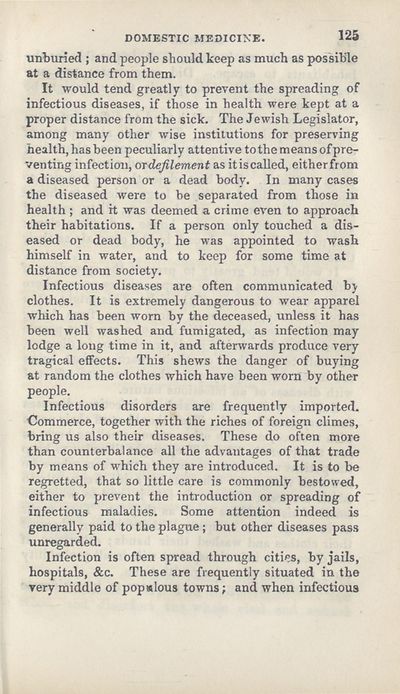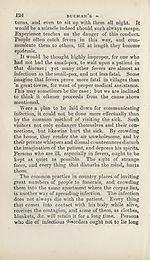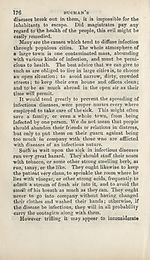Diseases > Domestic medicine
(159)
Download files
Complete book:
Individual page:
Thumbnail gallery: Grid view | List view

DOMESTIC MEDICINE. 125
unburied ; and people should keep as much as possible
at a distance from them.
It would tend greatly to prevent the spreading of
infectious diseases, if those in health were kept at a
proper distance from the sick. The Jewish Legislator,
among many other wise institutions for preserving
health, has been peculiarly attentive tothe means ofpre-
venting infection, ordefilement as itiscalled, eitherfrom
a diseased person or a deawl body. In many cases
the diseased were to be separated from those in
health ; and H was deemed a crime even to approach
their habitations. If a person only touched a dis¬
eased or dead body, he was appointed to wash
himself in water, and to keep for some time at
distance from society.
Infectious diseases are often communicated by
clothes. It is extremely dangerous to wear apparel
which has been wom by the deceased, unless it has
been well washed and fumigated, as infection may
lodge a long time in it, and afterwards produce very
tragical effects. This shews the danger of buying
at random the clothes which have been worn by other
people.
Infectious disorders are frequently imported.
Commerce, together with the riches of foreign climes,
bring us also their diseases. These do often more
than counterbalance all the advantages of that trade
by means of which they are introduced. It is to be
regretted, that so little care is commonly bestowed,
either to prevent the introduction or spreading of
infectious maladies. Some attention indeed is
generally paid to the plague; but other diseases pass
unregarded.
Infection is often spread through cities, by jails,
hospitals, &c. These are frequently situated in the
very middle of populous towns; and when infectious
unburied ; and people should keep as much as possible
at a distance from them.
It would tend greatly to prevent the spreading of
infectious diseases, if those in health were kept at a
proper distance from the sick. The Jewish Legislator,
among many other wise institutions for preserving
health, has been peculiarly attentive tothe means ofpre-
venting infection, ordefilement as itiscalled, eitherfrom
a diseased person or a deawl body. In many cases
the diseased were to be separated from those in
health ; and H was deemed a crime even to approach
their habitations. If a person only touched a dis¬
eased or dead body, he was appointed to wash
himself in water, and to keep for some time at
distance from society.
Infectious diseases are often communicated by
clothes. It is extremely dangerous to wear apparel
which has been wom by the deceased, unless it has
been well washed and fumigated, as infection may
lodge a long time in it, and afterwards produce very
tragical effects. This shews the danger of buying
at random the clothes which have been worn by other
people.
Infectious disorders are frequently imported.
Commerce, together with the riches of foreign climes,
bring us also their diseases. These do often more
than counterbalance all the advantages of that trade
by means of which they are introduced. It is to be
regretted, that so little care is commonly bestowed,
either to prevent the introduction or spreading of
infectious maladies. Some attention indeed is
generally paid to the plague; but other diseases pass
unregarded.
Infection is often spread through cities, by jails,
hospitals, &c. These are frequently situated in the
very middle of populous towns; and when infectious
Set display mode to:
![]() Universal Viewer |
Universal Viewer | ![]() Mirador |
Large image | Transcription
Mirador |
Large image | Transcription
| Antiquarian books of Scotland > Diseases > Domestic medicine > (159) |
|---|
| Permanent URL | https://digital.nls.uk/119890050 |
|---|
| Description | Thousands of printed books from the Antiquarian Books of Scotland collection which dates from 1641 to the 1980s. The collection consists of 14,800 books which were published in Scotland or have a Scottish connection, e.g. through the author, printer or owner. Subjects covered include sport, education, diseases, adventure, occupations, Jacobites, politics and religion. Among the 29 languages represented are English, Gaelic, Italian, French, Russian and Swedish. |
|---|

